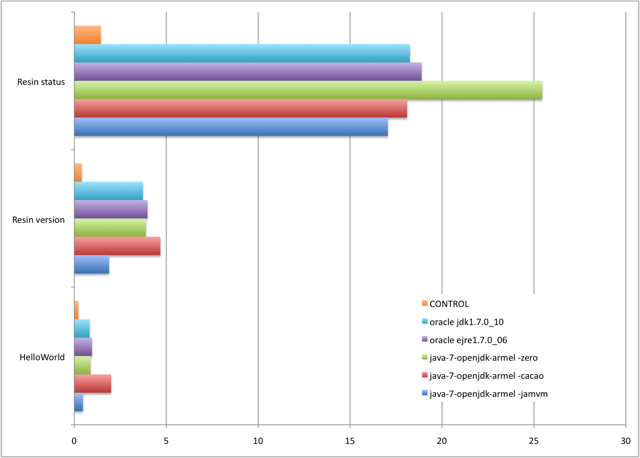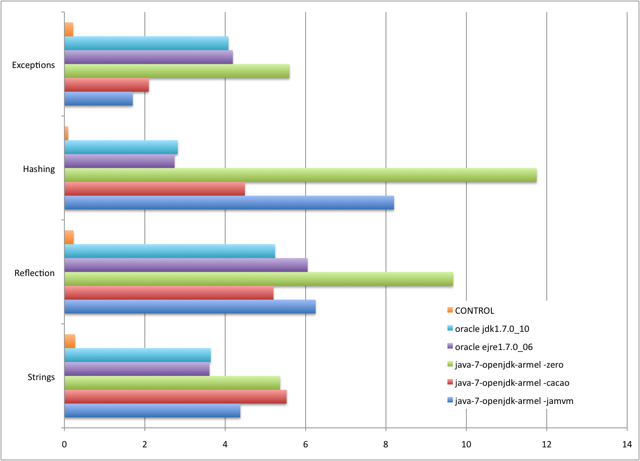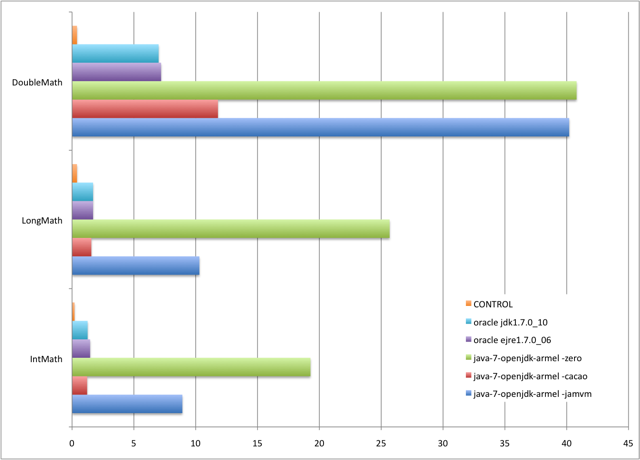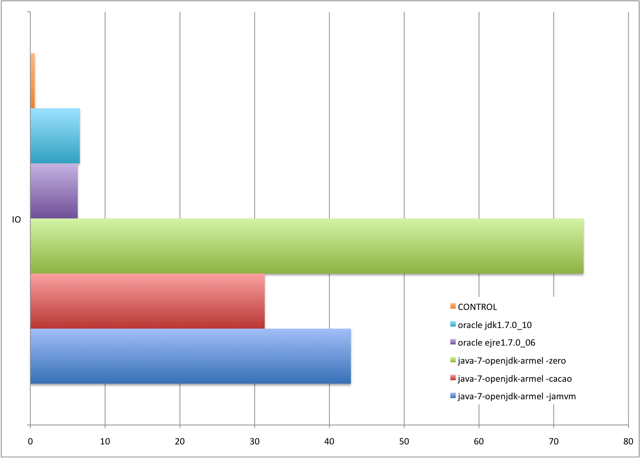Java On Raspberry Pi Performance
From Resin 4.0 Wiki
(Difference between revisions)
| (4 intermediate revisions by one user not shown) | |||
| Line 1: | Line 1: | ||
| + | {{Embedded}} {{Raspi}} | ||
| + | |||
My objective is to performance test basic JVM functions of different JVMs on the Raspberry Pi hardware to see which JVM is fastest overall. For this I have created a few different tests that exercise specific operations, such as floating-point math, file IO, etc. The results are not relevant compared to other hardware. The results metrics are really not important either other than as they compare to the same test on a different JVM. | My objective is to performance test basic JVM functions of different JVMs on the Raspberry Pi hardware to see which JVM is fastest overall. For this I have created a few different tests that exercise specific operations, such as floating-point math, file IO, etc. The results are not relevant compared to other hardware. The results metrics are really not important either other than as they compare to the same test on a different JVM. | ||
| + | |||
| + | * '''Also see [[Paul's Raspberry Pi Journal]]''' | ||
| + | |||
= VMs Tested = | = VMs Tested = | ||
| Line 5: | Line 10: | ||
There's currently a few different JVMs available for Raspberry Pi. I tested these: | There's currently a few different JVMs available for Raspberry Pi. I tested these: | ||
| − | * Oracle | + | * [http://www.oracle.com/technetwork/java/javase/downloads/index.html Oracle Java SE Development Kit 7u10 (Linux ARM v6/v7 Soft Float ABI)] |
| + | |||
| + | java version "1.7.0_10" | ||
| + | Java(TM) SE Runtime Environment (build 1.7.0_10-b18) | ||
| + | Java HotSpot(TM) Client VM (build 23.6-b04, mixed mode) | ||
| + | |||
| + | * [http://www.oracle.com/technetwork/java/embedded/downloads/javase/index.html Oracle Java SE Embedded version 6 Update 38 (ARMv6/7 Linux - Headless EABI, VFP, SoftFP ABI, Little Endian)] | ||
java version "1.7.0_06" | java version "1.7.0_06" | ||
| Line 11: | Line 22: | ||
Java HotSpot(TM) Embedded Client VM (build 23.2-b09, mixed mode) | Java HotSpot(TM) Embedded Client VM (build 23.2-b09, mixed mode) | ||
| − | * java-7-openjdk-armel with -zero | + | * [http://icedtea.classpath.org/wiki/ZeroSharkFaq java-7-openjdk-armel with -zero] |
java version "1.7.0_03" | java version "1.7.0_03" | ||
| Line 17: | Line 28: | ||
OpenJDK Zero VM (build 22.0-b10, mixed mode) | OpenJDK Zero VM (build 22.0-b10, mixed mode) | ||
| − | * java-7-openjdk-armel with -cacao | + | * [http://www.cacaojvm.org/ java-7-openjdk-armel with -cacao] |
java version "1.7.0_03" | java version "1.7.0_03" | ||
| Line 23: | Line 34: | ||
CACAO (build 1.1.0pre2, compiled mode) | CACAO (build 1.1.0pre2, compiled mode) | ||
| − | * java-7-openjdk-armel with -jamvm | + | * [http://jamvm.sourceforge.net/ java-7-openjdk-armel with -jamvm] |
java version "1.7.0_03" | java version "1.7.0_03" | ||
| Line 29: | Line 40: | ||
JamVM (build 1.6.0-devel, inline-threaded interpreter with stack-caching) | JamVM (build 1.6.0-devel, inline-threaded interpreter with stack-caching) | ||
| − | * | + | * CONTROL was a MacBook Pro OSX Darwin Kernel Version 10.8.0 |
** 2.4 GHz Intel Core 2 Duo | ** 2.4 GHz Intel Core 2 Duo | ||
** All tests we run with -d32 to force 32-bit mode | ** All tests we run with -d32 to force 32-bit mode | ||
| Line 39: | Line 50: | ||
= Results Summary = | = Results Summary = | ||
| − | * | + | * '''Oracle JDK VM looks to be the clear winner in term of overall performance''' |
| − | * Jam VM | + | * Oracle's VMs are fastest in the most categories. |
| + | * The JDK _10 VM is slightly faster in most categories than the Embedded _06 JRE | ||
| + | * Jam VM has impressive startup speed but nothing else | ||
* Zero was the slowest in most categories, but it's also the only OpenJDK VM that appears to be complete | * Zero was the slowest in most categories, but it's also the only OpenJDK VM that appears to be complete | ||
* Zero and Jamm were significantly slower in numerical calculations than the other 2 | * Zero and Jamm were significantly slower in numerical calculations than the other 2 | ||
| − | * IO performance was the most dramatic win for the Oracle | + | * IO performance was the most dramatic win for the Oracle VMs. IO is so much slower on the all the OpenJDK VMs that it signifigantly impacts Resin performance |
| − | * | + | * Cacao was clearly the fastest OpenJDK VM, although it's not a "complete" JVM and throws some warnings |
| + | * I am going to further test Cacao to see how Resin runs on it | ||
= Startup Time = | = Startup Time = | ||
| Line 98: | Line 112: | ||
=== Results === | === Results === | ||
| − | There's nothing outstanding here, although Zero VM is showing up slow again which correlates with my initial real-world tests of Resin. | + | There's nothing extremely outstanding here, although Zero VM is showing up slow again which correlates with my initial real-world tests of Resin. Cacao is looking good so far compared to the other 2 OpenJDK VMs. |
</td> | </td> | ||
| Line 104: | Line 118: | ||
</table> | </table> | ||
| − | + | = Math = | |
<table border="0" width="100%" cellpadding="0" cellspacing="0"> | <table border="0" width="100%" cellpadding="0" cellspacing="0"> | ||
| Line 119: | Line 133: | ||
=== Results === | === Results === | ||
| − | Clearly there's significant numerical operation slowness on Zero and | + | Clearly there's significant numerical operation slowness on Zero and JamVM and the difference is significant. Again Cacao compares well with Oracle. It's worth mentioning here that all of these are really small number. For anything other than constant intensive numerical calculation, these results will not make much impact overall. |
</td> | </td> | ||
| Line 125: | Line 139: | ||
</table> | </table> | ||
| − | + | = IO = | |
<table border="0" width="100%" cellpadding="0" cellspacing="0"> | <table border="0" width="100%" cellpadding="0" cellspacing="0"> | ||
| Line 138: | Line 152: | ||
=== Results === | === Results === | ||
| − | Out of all the tests I ran, I think this is the most significant. Resin does quite a lot of IO and these difference here is not small. I believe IO delays are the primary cause for the Resin slowness I'm experiencing. | + | Out of all the tests I ran, I think this is the most significant. Resin does quite a lot of IO and these difference here is not small. This are big numbers also, in the order of seconds rather than milliseconds as in the case of the numerical calculations above. I believe IO delays are the primary cause for the Resin slowness I'm experiencing. |
</td> | </td> | ||
</tr> | </tr> | ||
</table> | </table> | ||
Latest revision as of 00:00, 22 December 2012
My objective is to performance test basic JVM functions of different JVMs on the Raspberry Pi hardware to see which JVM is fastest overall. For this I have created a few different tests that exercise specific operations, such as floating-point math, file IO, etc. The results are not relevant compared to other hardware. The results metrics are really not important either other than as they compare to the same test on a different JVM.
- Also see Paul's Raspberry Pi Journal
Contents |
VMs Tested
There's currently a few different JVMs available for Raspberry Pi. I tested these:
java version "1.7.0_10" Java(TM) SE Runtime Environment (build 1.7.0_10-b18) Java HotSpot(TM) Client VM (build 23.6-b04, mixed mode)
java version "1.7.0_06" Java(TM) SE Embedded Runtime Environment (build 1.7.0_06-b24, headless) Java HotSpot(TM) Embedded Client VM (build 23.2-b09, mixed mode)
java version "1.7.0_03" OpenJDK Runtime Environment (IcedTea7 2.1.3) (7u3-2.1.3-1) OpenJDK Zero VM (build 22.0-b10, mixed mode)
java version "1.7.0_03" IcedTea Runtime Environment (IcedTea7 2.1.3) (7u3-2.1.3-1) CACAO (build 1.1.0pre2, compiled mode)
java version "1.7.0_03" OpenJDK Runtime Environment (IcedTea7 2.1.3) (7u3-2.1.3-1) JamVM (build 1.6.0-devel, inline-threaded interpreter with stack-caching)
- CONTROL was a MacBook Pro OSX Darwin Kernel Version 10.8.0
- 2.4 GHz Intel Core 2 Duo
- All tests we run with -d32 to force 32-bit mode
java version "1.6.0_37" Java(TM) SE Runtime Environment (build 1.6.0_37-b06-434-10M3909) Java HotSpot(TM) 64-Bit Server VM (build 20.12-b01-434, mixed mode)
Results Summary
- Oracle JDK VM looks to be the clear winner in term of overall performance
- Oracle's VMs are fastest in the most categories.
- The JDK _10 VM is slightly faster in most categories than the Embedded _06 JRE
- Jam VM has impressive startup speed but nothing else
- Zero was the slowest in most categories, but it's also the only OpenJDK VM that appears to be complete
- Zero and Jamm were significantly slower in numerical calculations than the other 2
- IO performance was the most dramatic win for the Oracle VMs. IO is so much slower on the all the OpenJDK VMs that it signifigantly impacts Resin performance
- Cacao was clearly the fastest OpenJDK VM, although it's not a "complete" JVM and throws some warnings
- I am going to further test Cacao to see how Resin runs on it



